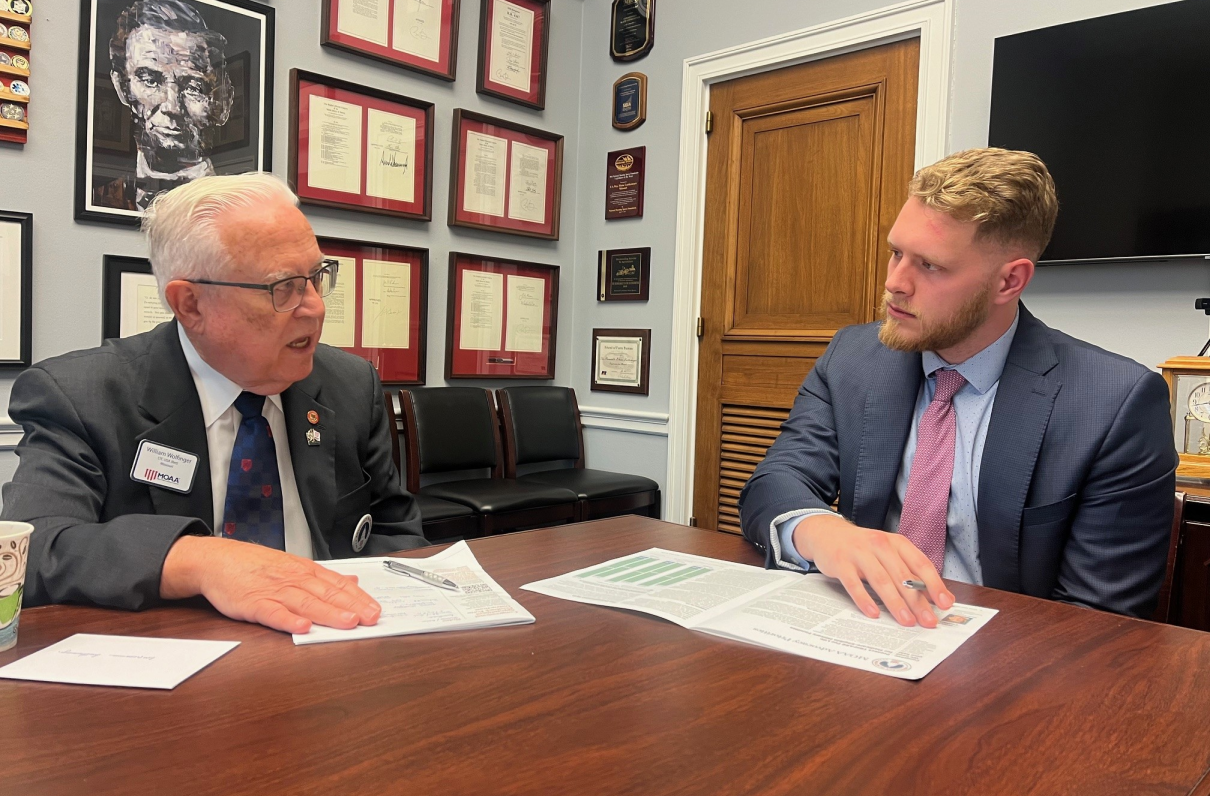(This article originally appeared in the December 2024 issue of Military Officer, a magazine available to all MOAA Premium and Life members. Learn more about the magazine here; learn more about joining MOAA here.)
For those looking to make the most of their advocacy efforts, MOAA’s State Legislative Exchange Forum invites collaboration and brings resources to use at the state level for a growing number of participants.
“Every state is different in how they handle their military issues,” said Lt. Col. Don Wolfinger, USA (Ret), one of the founding members of the forum. “There needed to be a way of getting the states together to exchange information and successes.”
The forum, founded in 2019, has quarterly online Zoom sessions that now reach MOAA members in all 50 states.
About a month before each meeting, an agenda is sent out with discussion topics and a link to the online session. There are usually two or three topics and a target of about an hour for the session, although it might go longer.
The invitation is open to MOAA members who want to talk about advocacy issues they have encountered and discuss with other participants about the best way forward. Afterward, the Zoom sessions are posted online along with any graphs, charts, and chat items for reference.
Join the Forum
- Col. Harold Cooney, USA (Ret), Pennsylvania
- Lt. Col. Shelly Kalkowski, USAF (Ret), Colorado
- Lt. Col. Don Wolfinger, USA (Ret), Missouri
Participants in the sessions may include MOAA council and chapter members and members of national MOAA’s Government Relations team. Periodically, the Defense-State Liaison Office (DSLO) is invited to join the sessions to discuss key DoD issues that states might want to be involved in, particularly if the states have active duty installations, Wolfinger said. DSLO regional liaisons assist state policymakers with legislation.
[RELATED: DoD Agency Names Top Priorities for State-Level Family Support in 2025]
An example of a state-specific issue that members might address in the forum is a move in California to go to a single-payer health care system, which is concerning, Wolfinger said.
“We’re watching it. The California Council and chapters have been discussing that with us and keeping us appraised of what’s happening there because eventually that could happen in other states,” he said.
Issues also getting state-level attention include property tax and income tax exemptions for veterans, license portability for spouses seeking employment, and unaccredited “claim sharks” who charge big fees and say they will assist veterans with VA claims.
[RELATED: MOAA's Military State Report Card and Tax Guide]
The intent of the forum is to provide communication among states so they can be aware of challenges and actions in other states and what tactics have worked well for them.
“For the forum, our goal is to share information and to educate, inform, and build relationships, giving the people an opportunity and a place to reach out so if I have a problem, ‘what did Texas do, what did Virginia do,’” said Col. Harold Cooney, USA (Ret). “You may just need to tweak the language based on your laws and your states, but you don’t need to reinvent the wheel.”
Members of various states can also help each other identify resources for researching advocacy topics, which has been an ongoing challenge, said Lt. Col. Shelly Kalkowski, USAF (Ret).
“It would be helpful if we could identify those as a forum and then state advocates can dig out data supporting their legislative message,” she said.
[RELATED: Latest Advocacy News From National MOAA]
Wolfinger said it’s useful to know the right department or official to consult for information, particularly when a state’s adjutant general might not be tracking a specific military issue.
The forum can also observe when an issue comes up in multiple states and when to communicate with the national-level team at MOAA when appropriate.
“It’s a two-way line of communication here,” Wolfinger said.
Want to Help Servicemembers in Your Community?
Learn how you can make a difference with your local chapter.

